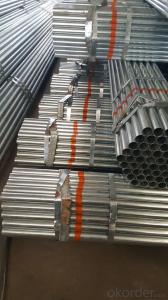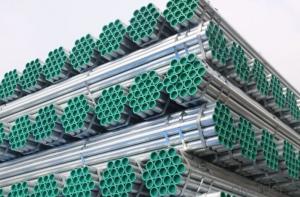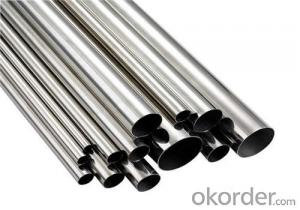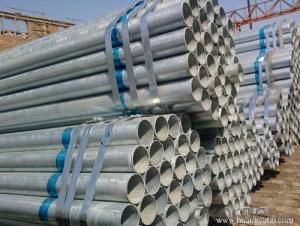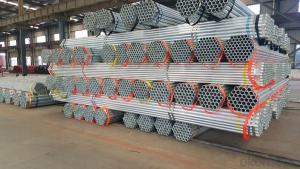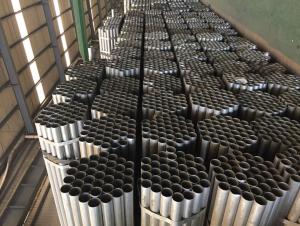Galvanized carbon welded steel pipe 200-300g
- Loading Port:
- Tianjin
- Payment Terms:
- TT OR LC
- Min Order Qty:
- 30 m.t.
- Supply Capability:
- 15000 m.t./month
OKorder Service Pledge
OKorder Financial Service
You Might Also Like
Specification
1、Structure of Galvanized carbon welded steel pipe 200-300g :
The surface of galvanized steel pipe welded steel pipe of hot dip galvanized layer or. Galvanized can increase the corrosion resistance of the steel tube, prolong service life. Galvanized pipe is widely used, in addition to water, gas, oil and other general low pressure fluid pipelines. It is also used in the petroleum industry, especially for offshore oil field of oil well pipe and oil pipe, chemical, coking equipment of oil heater, condensation cooler, coal run oil exchanger tube, and trestle pile, the mine tunnel support frame tube.
2、Main Features of Galvanized carbon welded steel pipe 200-300g :
• High manufacturing accuracy
• High strength
• Good visual effect
• Reasonable price
3、 Galvanized carbon welded steel pipe 200-300g Specification:
Standard | GB, DIN, ASTM ASTM A106-2006, ASTM A53-2007 |
Grade | 10#-45#, 16Mn 10#, 20#, 45#, 16Mn |
Thickness | 1 - 33 mm |
Section Shape | Round |
Outer Diameter | 21 - 610mm |
Place of Origin | Tianjin, China (Mainland) |
Secondary Or Not | Non-secondary |
Application | Hydraulic Pipe |
Technique | Cold Drawn |
Certification | API |
Surface Treatment | factory state or painted black |
Special Pipe | API Pipe |
Alloy Or Not | Non-alloy |
Length | 5-12M |
Outer Diameter | 21.3-610mm |
Grade | 20#, 45#, Q345, API J55, API K55, API L80, API N80, API P110, A53B |
Standard | ASME, ASTM |
1) Material:Q195 Q235 Q345 X42 X52
2) Specification range:OD:21.3-610mm,WT:6-70mm,length:6-12m or according to the requirement of clients.
3) Excutive standards:GB,ASME API5L.ASTM A 106/A53,Despite of the above standards,we can also supply seamless steel pipe with standard of DIN,JIS,and so on,and also develop new products according to the requirements of our clients!
4) Surface: galvanized.
5) Ends:Beveled or square cut,plastic capped,painted.
6) Packing:bundles wrapped with strong steel strip,seaworthy packing.
4、Packaging & Delivery
Packaging Details: | seaworthy package,bundles wrapped with strong steel strip |
Delivery Detail: | 15-30days after received 30%TT |
5、FAQ of Galvanized carbon welded steel pipe 200-300g :
①How is the quality of your products?
Our products are manufactured strictly according to national and internaional standard, and we take a test
on every pipe before delivered out. If you want see our quality certifications and all kinds of testing report, please just ask us for it.
Guaranteed: If products’ quality don’t accord to discription as we give or the promise before you place order, we promise 100% refund.
②How about price?
Yes, we are factory and be able to give you lowest price below market one, and we have a policy that “ for saving time and absolutely honest business attitude, we quote as lowest as possible for any customer, and discount can be given according to quantity”,if you like bargain and factory price is not low enough as you think, just don’t waste your time.Please trust the quotation we would give you, it is professional one.
③Why should you chose us?
Chose happens because of quality, then price, We can give you both.Additionally, we can also offer professional products inquiry, products knowledge train(for agents), smooth goods delivery, exellent customer solution proposals.Our service formula: good quality+good price+good service=customer’s trust
SGS test is available, customer inspection before shipping is welcome, third party inspection is no problem.
6、 Galvanized carbon welded steel pipe 200-300g Images:
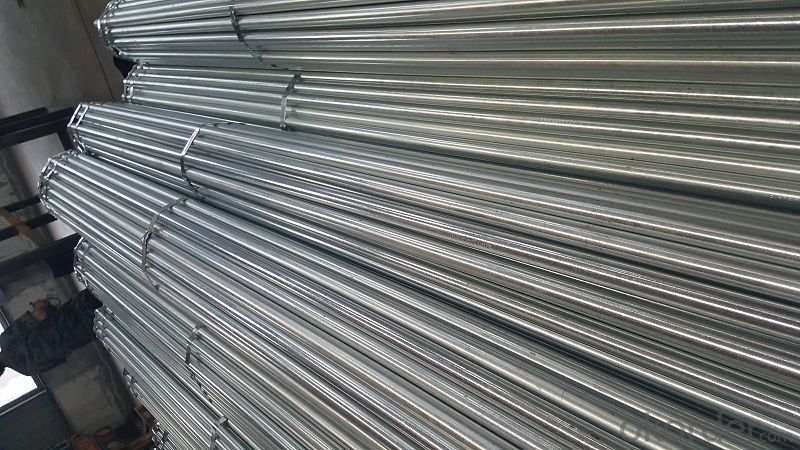
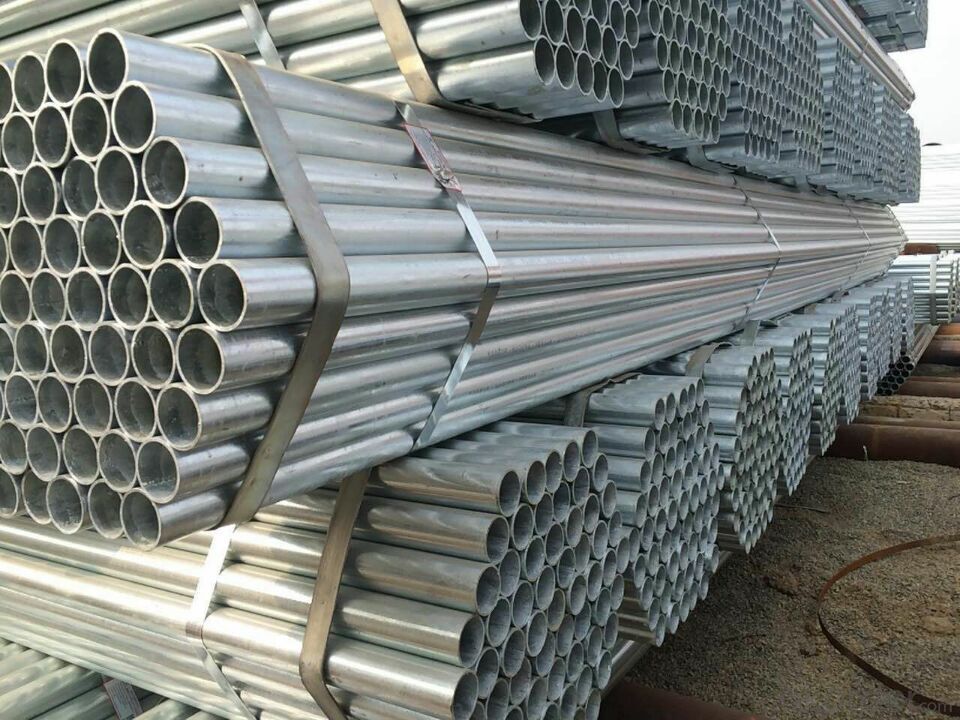
- Q: Can steel pipes be used for wastewater disposal?
- Yes, steel pipes can be used for wastewater disposal. Steel pipes are commonly used in wastewater systems due to their durability, strength, and resistance to corrosion. They can handle the high pressure and flow rates often associated with wastewater and can effectively transport it to treatment plants or other disposal points. Additionally, steel pipes can be coated or lined with materials that provide extra protection against corrosion or chemical reactions with the wastewater, further increasing their longevity and effectiveness in wastewater disposal.
- Q: How are steel pipes tested for strength and durability?
- Steel pipes are tested for strength and durability through various methods, including destructive and non-destructive testing. Destructive testing involves subjecting the pipes to intense pressure or impact to determine their breaking point, while non-destructive testing methods, such as ultrasonic or magnetic particle testing, are used to detect any internal or surface defects that may compromise their strength and durability. These tests ensure that steel pipes meet the required standards and can withstand the intended usage conditions.
- Q: How are steel pipes cleaned and maintained?
- Steel pipes are commonly cleaned and maintained through a variety of methods. Firstly, they are often cleaned using chemical solvents or detergents to remove any dirt, debris, or rust. This process is followed by rinsing the pipes thoroughly with water. Additionally, periodic inspections are conducted to identify any signs of corrosion or damage, which are then repaired promptly to prevent further deterioration. Lastly, applying protective coatings or paints on the pipes can help to enhance their longevity and prevent future corrosion.
- Q: Can steel pipes be used for conveying potable water?
- Yes, steel pipes can be used for conveying potable water. However, it is important to ensure that the steel pipes are coated or lined with suitable materials to prevent corrosion and contamination of the water supply. Regular maintenance and monitoring of the pipes are also necessary to ensure the water remains safe for consumption.
- Q: What are the specifications for steel pipes used in high-pressure applications?
- The specifications for steel pipes used in high-pressure applications typically include requirements for the pipe material, such as high strength and resistance to corrosion, as well as specific dimensions, thickness, and wall thickness to withstand the pressure. Additionally, they may need to meet specific industry standards, such as ASTM or ASME, and be tested for quality assurance, including pressure testing and non-destructive testing methods.
- Q: What are the advantages of PVC pipe and galvanized steel pipe?
- PVC pipeline use temperature is -5 to 90 degrees or so, according to the current market price of around 6000 yuan per ton, the price is cheap. Its corrosion resistance is good, can resist most of the acid and alkali, and unlike the steel pipe that is easy to rust, so in the construction of the upper and lower water pipes and other fields have gradually replaced the trend of steel pipe.
- Q: What are the different methods of pipe repair for steel pipes?
- There are several methods for repairing steel pipes, including spot repair, slip lining, pipe bursting, and pipe relining. Spot repair involves cutting out and replacing a small section of the damaged pipe. Slip lining involves inserting a smaller diameter pipe into the existing pipe to reinforce it. Pipe bursting involves breaking the old pipe while simultaneously installing a new one. Pipe relining involves inserting a liner into the damaged pipe and then curing it in place to create a new, seamless pipe within the existing one. The choice of method depends on the extent and location of the damage, as well as budget and time constraints.
- Q: Are steel pipes suitable for high-pressure applications?
- Indeed, steel pipes prove to be an appropriate choice when it comes to high-pressure applications. Renowned for their robustness and endurance, steel pipes are exceptionally well-suited for managing high-pressure scenarios. They possess the remarkable ability to endure the intense internal pressure exerted by fluids or gases without buckling or rupturing. Thanks to their high tensile strength, steel pipes effectively combat the forces that arise in high-pressure environments, thereby ensuring the security and dependability of the piping system. Furthermore, steel pipes can be manufactured with thicker walls, further bolstering their capacity to withstand elevated pressures. Consequently, steel pipes find extensive utilization in various industries, such as oil and gas, petrochemical, power generation, and water distribution, where high-pressure applications are customary.
- Q: How do you prevent steel pipes from freezing?
- To avoid freezing of steel pipes, there are several actions that can be taken: 1. Insulate the pipes: Utilize foam insulation sleeves or wrap the pipes with insulation tape. This will help maintain the temperature of the pipes and prevent freezing. 2. Seal any gaps or cracks: Examine the area surrounding the pipes and seal any gaps or cracks using caulk or expanding foam. This will prevent cold air from entering and causing freezing. 3. Install heat cables: Wrap heat cables around the steel pipes to provide a constant source of warmth. These cables can be controlled by a thermostat, ensuring that the pipes remain above freezing temperature. 4. Maintain above-freezing temperature: In regions with severe cold weather, it is recommended to keep the indoor temperature above freezing, even if the property is unoccupied. This will help maintain a suitable temperature for the pipes and prevent freezing. 5. Open cabinets and faucets: During extremely cold weather, open cabinet doors in kitchens and bathrooms to allow warm air to circulate around the pipes. Additionally, allowing faucets to drip slightly can keep water flowing and prevent freezing. 6. Drain the pipes: If the property will be vacant during freezing weather, it is advisable to completely drain the pipes. This can be achieved by shutting off the main water supply and opening all faucets until no water remains. This minimizes the risk of freezing and potential damage. Remember, taking preventive measures is vital in safeguarding steel pipes against freezing. By implementing these actions, you can significantly reduce the chances of frozen pipes and costly repairs.
- Q: Can steel pipes be used for oil refineries?
- Yes, steel pipes can be used for oil refineries. Steel pipes are commonly used in oil refineries due to their high strength, durability, and resistance to corrosion. They can handle the high pressure and temperature requirements of the oil refining process, making them suitable for transporting and distributing various petroleum products within the refinery.
Send your message to us
Galvanized carbon welded steel pipe 200-300g
- Loading Port:
- Tianjin
- Payment Terms:
- TT OR LC
- Min Order Qty:
- 30 m.t.
- Supply Capability:
- 15000 m.t./month
OKorder Service Pledge
OKorder Financial Service
Similar products
Hot products
Hot Searches
Related keywords
